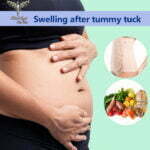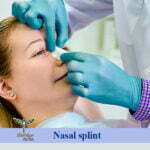The process of rhinoplasty is a sequential process that starts sometime before the day of surgery and continues until some time after that. The surgeon considers each of these steps to be valuable in their place and believes that failure in any of them can hurt the entire process. In this article, the best rhinoplasty surgeon in Dubai discussed the diet after rhinoplasty, which is one of the most important factors of post-operative care.

What ingredients should be included in the diet before and after rhinoplasty?
After deciding to operate, the surgeon recommends eating healthy foods to reduce the risk of surgery and speed up the recovery process as part of post-nose job care.
Of course, dietary changes are required after surgery. During the recovery period, we must avoid and also must include certain foods in our diet. The purpose of all this sensitivity in diet after rhinoplasty is to speed up recovery by helping the immune system and reducing pain, inflammation, and swelling.
Diet after rhinoplasty is not limited only to the post-rhinoplasty period, and sometime before that, we have to make changes in nutrition. It is better to consume the following foods 2 to 4 weeks before nose surgery:
Minerals and vitamins: Starting a balanced multivitamin under the supervision of a rhinoplasty surgeon in the best plastic surgery clinic in Dubai, three weeks before surgery can help speed recovery. You should use adequate amounts of vitamins before surgery, but except for vitamin C, the consumption of other vitamins should not be too high. Studies show that absorption of vitamin C is very beneficial for wound healing.
Protein: Protein is the second most important building block and vital factor for building and repairing body tissues. Organs, hormones, red blood cells, the immune system, and enzymes all contain protein. It is necessary to consume a sufficient amount of this substance to meet daily needs and prepare the body for surgery to help repair tissues.
Green tea: Green tea is a source of antioxidants. Green tea can have negative effects on anesthesia, blood pressure, and heart rate. Stop drinking green tea at least 10 days before your nose surgery and consult about the right time to resume it.
Fruits and vegetables: Fruits and vegetables are usually the central part of nutrition after rhinoplasty. Of course, it is not recommended to consume fruits and vegetables 24 hours before the operation, due to their high fiber content. Digestion of fruits, vegetables, and grains, compared to other foods, takes longer, so it is better to have a small amount of food in the stomach before surgery. Following these tips can help you achieve a successful process.
Diet after rhinoplasty – What foods should we eat?
After the operation and the anesthesia wears off, you will feel a little hungry. Soft meals that are slightly warm and tasty are suitable for the care period after rhinoplasty surgery. Yogurt or lukewarm soup are the best food choices for diet after rhinoplasty. Depending on the level of nausea, it is better to drink fluids immediately after surgery. Continue to eat soft foods for a few days after the operation.
Protein
Protein provides amino acids needed for wound and tissue healing. The best sources of protein are lean meat, chicken, eggs, dairy products, beans, lentils, nuts, and soy products.
fat
Fat provides energy to the body and improves the response of the immune system. Do not forget healthy fats such as olive oil, avocado, and nuts to strengthen the immune system.
fiber
Although you should eat soft meals during the first few days after surgery, be sure to include fiber in your diet after rhinoplasty during this period. Constipation after surgery is not far from expected due to the mixing of food with drugs, reduced activity level, and limited nutrition after a nose job. Adding some fiber to the diet during the postoperative care period can improve bowel movements. Soft fruits such as pears and various types of berries, and cooked vegetables such as carrots and cereals are rich sources of fiber.
Anti-inflammatory foods
The best surgeon for rhinoplasty in Dubai recommends eating anti-inflammatory foods during recovery. These foods contain substances that prevent swelling of the nose and excessive bruising. Eating plenty of green leafy vegetables, apples, citrus fruits, and red onions also have anti-inflammatory properties. So, add them to the diet after rhinoplasty
Water
The recovery period is not a good time to reduce water consumption, on the contrary, it is recommended to drink at least eight glasses of water daily during this period. Do this in the pre-operative period as well. If you are taking medication, drink more water.
Wound healing foods
One of the things that you should follow in your diet after rhinoplasty is eating foods that can help heal your wounds. These options include foods that contain a lot of protein such as meat, fish, eggs, and foods that are considered rich sources of vitamin A. Vitamin A as a useful factor in the rapid healing of wounds can be found in foods such as carrots, oranges, and dark green leafy vegetables such as spinach. In addition, foods rich in vitamin C, such as citrus fruits and seafood, which are rich sources of zinc, are options that include in the diet and can play a significant role in speeding up the healing of wounds.
Is it necessary to eat pineapple before and after nose surgery?
Eating pineapple a few days before surgery and a few days after it is considered a wonderful prescription. Pineapple contains bromelain, a powerful enzyme with unique properties that speed up the recovery process and post-operative care by reducing inflammation and also minimizes bruising. Therefore, it is useful to add pineapple to your diet after rhinoplasty.
Bromelain improves digestion by relieving nausea and preventing nasal congestion. Consult with the best rhinoplasty surgeon in Dubai before starting to consume. The Best surgeon at Blue Angel Poly Clinic in Dubai will recommend the right amount to achieve the best result. Celery juice also reduces inflammation and eliminates a considerable amount of bruises.
Some important points regarding diet after rhinoplasty:
Avoid eating foods that require a lot of chewing to avoid putting pressure on the nose. If you put your hand on your nose before surgery, you will see how much the nose moves while chewing food. Of course, this movement does not cause a problem under normal conditions, but after surgery, considering that the goal is to reduce side effects, it is better to focus your diet after rhinoplasty on soft foods and liquids rather than hard food. It will help to minimize side effects.
Do not drink alcohol or caffeine after the surgery. Consumption of caffeinated and alcoholic drinks should be postponed for a few days. Alcohol is a blood thinner and increases the risk of bleeding, formation of blood clots and accumulation of blood under the skin, and swelling of the nose after surgery. Caffeine also increases blood pressure and causes similar problems for the patient.
Limit the consumption of salt and spices after surgery. High amounts of salt and sodium cause water retention and increase nasal inflammation. Salty and spicy foods can cause bleeding due to their effect on high blood pressure. In addition, these types of foods irritate the tissues in the nose that have a mucous structure, and this irritation can delay the healing of wounds. Stimulation of the digestive system due to the consumption of spicy foods is another problem that can disrupt the recovery process, and as a result, you should refrain from consuming them during the recovery period.
Watch the temperature of the food you eat. Very hot or very cold foods can slow down the healing process. To prevent mouth burns during the recovery period, it is recommended to postpone the consumption of soup and other hot foods for several weeks. Of course, very cold foods can also cause burns caused by extreme cold and cause headaches and teeth sensitivity, and worsen the situation. You should eat foods such as fruits, cooked vegetables, protein, and fiber sources that have the most nutritional value. Healthy eating includes these food choices that will help you have a successful recovery period.
How long should we follow the diet after rhinoplasty?
Usually, the recovery period after the operation lasts one week, but in some special cases, it lasts up to two weeks. Therefore, during this period, you should follow the diet according to the instructions. After this period, you can slowly resume your normal diet.



